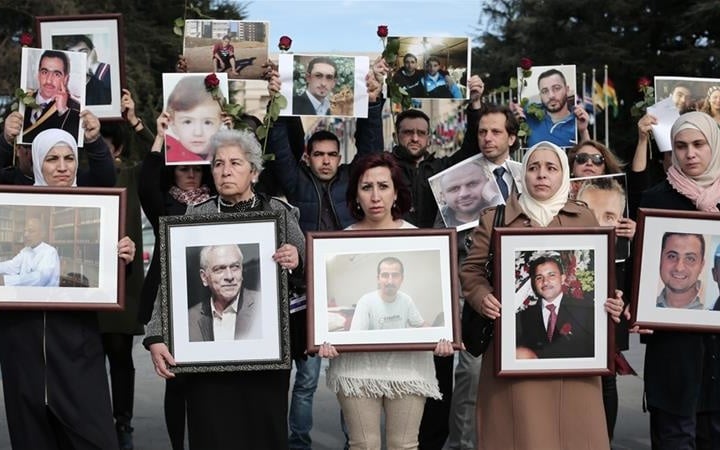Relatives hold up photos of the disappeared in Syria, in a rally outside UN headquarters in Geneva, Switzerland (Dylan Collins/Al Jazeera)
Facing new US sanctions compounding Syria’s economic crisis, the Assad regime has held talks in Damascus with Iran’s senior officials.
The regime’s recently-appointed Prime Minister Hussein Arnous hosted Hassan Danaeifar, the advisor to Iran’s 1st Vice President Eshaq Jahangiri on Wednesday. The meeting came hours after the “Caesar Act” restrictions came into effect.
The measures are named after “Caesar”, the defecting military photographer who brought out images of thousands of detainees executed, tortured to death, or perishing from inhuman conditions in regime prisons.
The sanctions seek to cut the regime off from the international financial system, amid a 75% drop in Syrian GDP since the uprising began in March 2011. Any company who does business with the regime, or with its backers Russia and Iran, can be punished by the US Treasury.
The measures name Bashar al-Assad’s wife Asma and her family, his brother, and his sister as well as senior generals and Iranian-led militia.
Secretary of State Mike Pompeo said, “We anticipate many more sanctions and we will not stop until Assad and his regime stop their needless, brutal war against the Syrian people and the Syrian government agrees to a political solution to the conflict.”
The European Union renewed its sanctions on May 28 against the regime’s “violent repression”.
“Close Cooperation” But No Details
Syrian State news agency SANA gave no details of a regime-Iranian response in its readout of the Prime Minister’s meeting.
The article said Arnous and Danaiefar discussed “economic cooperation in the face of the challenges and sanctions to which the Syrian and Iranian peoples are passing through”
Arnous spoke of “steady steps towards further development and close cooperation”.
He declared, “The Syrian state is working with a comprehensive plan for agricultural development and expansion of agricultural and food industries to enhance the steadfastness of the Syrian people in the face of the sanction and the unfair siege.”
On Tuesday, Iranian Foreign Minister Mohammad Javad Zarif said during a trip to Istanbul and Moscow, “We have strong economic relationships with Syria.”
He cited the “credit line” in which Iran has sent billions of dollars, including oil supplies, to the regime.
However, Iran’s support has been limited in recent years. by its own economic crisis, fed by long-term structural issues and US sanctions.
On Thursday, Foreign Ministry spokesman Abbas Mousavi said of the Caesar Act:
Iran attaches no value to such cruel and unilateral sanctions which arise from bullying behavior….We will continue economic cooperation with the Syrian nation and government as before and despite sanctions, we will strengthen economic ties with the country.
However, with Assad regime providing little reconstruction despite a Russian-enabled reoccupation of much of Syria, Mousavi gave no information about the economic links.

